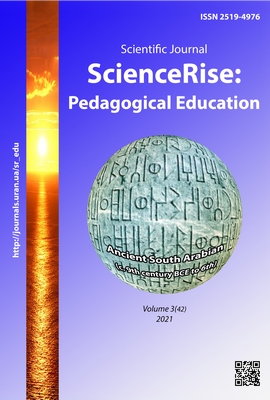Characteristics of structural components, criteria and indicators, levels of formation of value-semantic experience of future specialists in foreign philology
DOI:
https://doi.org/10.15587/2519-4984.2021.234009Keywords:
specialists in foreign philology, axiology, value education, diagnostics of personality qualities formationAbstract
Changing axiological guidelines is a fundamental topic for higher education. In particular, the modern professional training of future foreign philologists cannot ignore the need to turn to axiological discourse. The need for special attention to axiological issues in the context of professional training of specialists of the relevant profile led to the definition of pedagogical conditions for the formation of value-semantic experience of these specialists. The implementation of such pedagogical conditions is ensured, including by the evaluation of the achieved results. The latter determines the research interest in the elements of diagnosis - components, criteria, indicators and levels of their implementation.
The purpose of the research is to practically define and substantiate the components of the formation of value-semantic experience, the criteria, corresponding to them, the indicators characteristic of the criteria and the levels of their manifestation are determined. Achieving this goal involves (1) determining these elements of the diagnosis of the formation of a certain competence (or desired quality) and (2) their practical justification.
The generalized research experience shows that the diagnosis of the formation of certain competencies (individual qualities) is usually accompanied by the selection of components of cognitive, motivational (value-motivational), operational-activity (functional-activity) and organizational. Taking into account the practice of applying the competence approach to determine the criteria in the work, the criteria of formation of value-semantic experience of future specialists in foreign philology are applied: cognitive, value-motivational, operational-activity, organizational with corresponding indicators, as well as certain levels of their manifestation.
The researched and substantiated elements of diagnosis open the way to practical modeling of the structural and semantic model of the process of formation of value-semantic experience of future specialists in foreign philology
References
- Svyshch, L. O. (2021). Tsinnisno-smyslovyi dosvid yak umova formuvannia aksiolohichnoi kompetentnosti. Grail of Science, 1, 428–430. doi: http://doi.org/10.36074/grail-of-science.19.02.2021.090
- Protska, S. M. (2019). Kompiuterno oriientovana metodyka formuvannia profesiino-pedahohichnoi kompetentnosti maibutnikh uchyteliv-filolohiv. Kyiv, 304.
- Vasylieva, M. P. (2004). Teoretychni osnovy deontolohichnoi pidhotovky pedahoha, 38.
- Spitzberg, B. H., Cupach, W. R. (1984). Interpersonal Communication Competence. Beverly Hills: Sage, 236. Available at: https://scirp.org/reference/referencespapers.aspx?referenceid=2021723
- Chubuk, R. V. (2008). Kryterii, pokaznyky ta rivni profesiinoi kompetentnosti sotsialnykh pedahohiv. Naukovi zapysky Natsionalnoho universytetu "Ostrozka akademiia". Seriia: Psykholohiia i pedahohika, 11, 253–263.
- Slastenin, V. A., Podymova, L. S. (1997). Pedagogika. Innovatsionnaya deyatelnost. Moscow: Magistr, 223.
- Molchaniuk, O. V. (2020). Theoretical-methodological foundations of training values-based attitude to the nature of future biology teachers. Kyiv, 469.
- Hniedkova, O. O. (2017). Pedahohichni umovy formuvannia kontroliu fakhovykh znan maibutnikh uchyteliv inozemnykh mov u protsesi dystantsiinoho navchannia. Kherson, 294.
- Samborska, E. V. (2015). Criteria, indexes and levels of readiness of master’s degrees of technologicaleducation to monitoring of educational achievements of students. Naukovyi chasopys Natsionalnoho pedahohichnoho universytetu imeni M. P. Drahomanova. Seriia 5. Pedahohichni nauky: realii ta perspektyvy, 51, 239–244.
- Kohut, I. V. (2015). Formuvannia profesiino-pedahohichnoi komunikatyvnoi kompetentnosti maibutnoho vchytelia. Poltava, 250.
- Postylna, O. O. (2016). Formuvannia moralnykh tsinnostei studentiv pedahohichnykh universytetiv zasobamy informatsiino-komunikatsiinykh tekhnolohii. Melitopol, 223.
- Protska, S. M. (2019). Kompiuterno oriientovana metodyka formuvannia profesiino-pedahohichnoi kompetentnosti maibutnikh uchyteliv-filolohiv. Kyiv, 304.
- Galetskyi, S. M. (2020). The formation of communicative competence of future foreign language teachers by the means of information and communication technologies. Zhytomyr, 292.
- Honcharenko S. U. (1995). Pedahohichni doslidzhennia: metodolohichni porady molodym naukovtsiam. Kyiv: APN Ukrainy, 47.
- Bekh, I., Pelekh, Y. (2020). Genesis-modeling Method in the Educational Process. Journal of History Culture and Art Research, 9 (2), 90–105. doi: http://doi.org/10.7596/taksad.v9i2.2614
- Pérez-Jorge, D., Barragán Medero, F., Molina-Fernández, E. (2017). A Study of Educational Programmes that Promote Attitude Change and Values Education in Spain. Asian Social Science, 13 (7), 112–130. doi: http://doi.org/10.5539/ass.v13n7p112
Downloads
Published
How to Cite
Issue
Section
License
Copyright (c) 2021 Liliia Svyshch

This work is licensed under a Creative Commons Attribution 4.0 International License.
Our journal abides by the Creative Commons CC BY copyright rights and permissions for open access journals.
Authors, who are published in this journal, agree to the following conditions:
1. The authors reserve the right to authorship of the work and pass the first publication right of this work to the journal under the terms of a Creative Commons CC BY, which allows others to freely distribute the published research with the obligatory reference to the authors of the original work and the first publication of the work in this journal.
2. The authors have the right to conclude separate supplement agreements that relate to non-exclusive work distribution in the form in which it has been published by the journal (for example, to upload the work to the online storage of the journal or publish it as part of a monograph), provided that the reference to the first publication of the work in this journal is included.







